Scottish/Kenyan storyteller Mara Menzies fights racism with words in her new book Blood and Gold
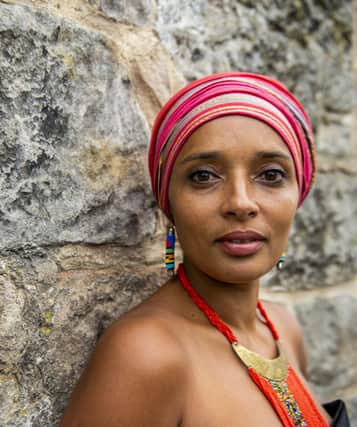

How do you address racism in Scotland? Award winning storyteller and writer Mara Menzies’s way is with words. Powerful words. Drawing on both her Kenyan and Scottish heritage she weaves the stories, myths and legends of both cultures into her spellbinding new book Blood and Gold, published this week.
Starting with the real life experiences of two black men arriving in Edinburgh 140 years apart, the first welcomed and respected in 1846, the second murdered in The Grassmarket in 1989, the accomplished storyteller and performer takes a look at race and exploitation and the colonial past that Scotland must face, blending it with stories that are simultaneously universal and very personal to her.
Writing down the lore of her dual heritage for the first time in book form after performing Blood and Gold at the Edinburgh Festival Fringe in 2019 then touring in 27 countries, Menzies takes us on a fantastical journey through the eyes of a teenage girl growing up black in a white world. Opening a box of stories left by her dying mother, she takes us into a mythical, magical world, beautifully illustrated by Eri Griffin, where she is stalked by the shapeshifting Shadowman, who feeds on insecurity and fear.
As the girl learns more about her African ancestry, about slavery and colonisation, she also hears of the pride and sacrifice that have made her unique and celebrates her love of both cultures, while asking us to examine our own attitudes and beliefs.
“It's heavily inspired also by my own personal experiences,” says the mother of two at her home in Edinburgh, where she settled at 13 after to and fro-ing between Scotland and Kenya.
Born in Edinburgh to a white Scottish father and black Kenyan mother, Menzies spent her younger years in Diani, on the Kenyan coast near Mombasa by the Indian Ocean, before the family returned to Scotland.
Now 42, with a degree in marketing and French from Stirling University, and 12 years as a professional storyteller, as she sits in her Edinburgh home surrounded by the happy paraphernalia of family life, she is friendly and chatty, in a white cotton dress with her hair tied back. With two children’s books written for her children aged seven and 14 - Coco the Crocodile and Starbird, inspired by a line in a Ben Okri novel - she’s a born storyteller and the words pour forth but it’s nothing to the Mara who later emerges ready to have her photograph taken, transformed in a bright headscarf and long red cotton African skirt and black bodice, complete with Masai beaded jewellery.
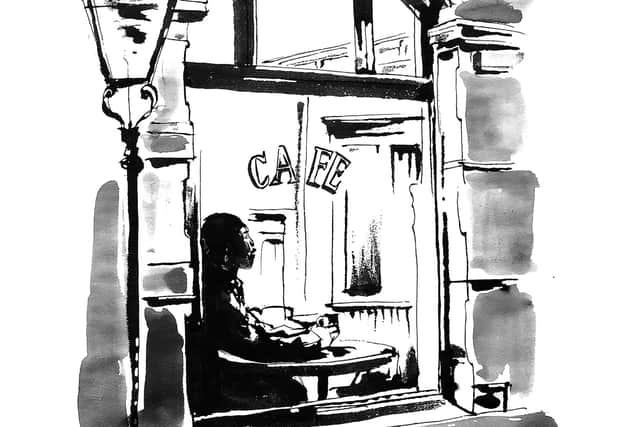

“I'm naturally quite quiet when I'm off the stage and I’m very happy to be in the background,” she says. “I’m not the life and soul of the party. But when I’m on, ta-dah! It’s like a superpower.”
Before this she chats over tea, under the watchful eyes of a couple of elongated carved wooded heads she picked up on her storytelling travels in Tanzania, revealing her own family’s inspirational story and how it became part of Blood and Gold.
“My grandfather was the messenger boy for the district commissioner in colonial Kenya, so the British government, when he was eight or nine years old. He saw the wife of the governor doing an awful lot of the work, writing and researching and thought ‘ah, so women can actually learn how to read’. When he married my grandmother and they had three daughters he put them into school and it caused a huge problem in his family.
“He ended up being poisoned by them because he was wasting family money he should have been spending on the boys and then my grandmother was expected to marry his brother - the tradition was wife inheritance - so she ran away and took her three kids. She didn't know where she was going, didn’t have any money so put my mother (the eldest) in an orphanage that was run by the Little Sisters of the Poor, a Scottish charity. She was nine at the time and that was her first connection to Scotland, then later she was sponsored by a Scottish lady and came to study nursing in the 1960s, and met my dad. So I've used elements of that as the basis for exploring this kind of movement of people and that whole colonial situation.”
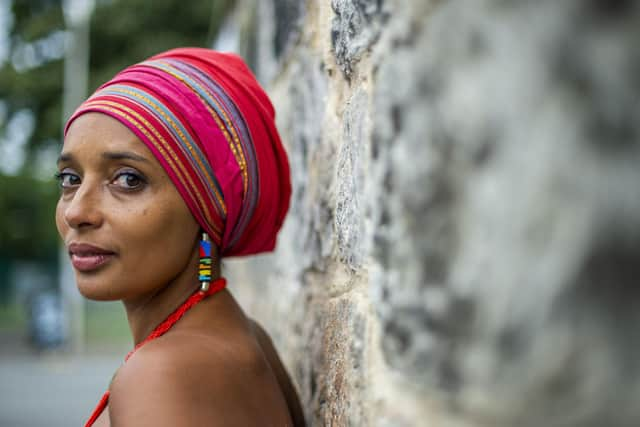

On top of that Menzies has layered elements of African stories - from Kenya, Nigeria and Ghana, as well as the influence of stories she has heard since in Scotland, from tales of selkies and changelings to love stories with feisty female characters like Tam Lin.
“Most of the stories in Blood and Gold are completely from the imagination but every story has a root somewhere. So I might take something I heard in a Nigerian folktale or a Kenyan myth and make it into something much bigger. Things that have just sort of been muddling away for years until suddenly the time is right for them to be told.”
In Kenya Menzies grew up in a family of storytellers but didn’t realise at the time that’s what they were. With children playing freely outdoors and no TV apart from an hour a week at a local hotel - “Mr Brown’s School Days and Top of the Pops,” she says and laughs at the memory, they filled their time with big family meals and socialising.
“We were always hosting or going to other people's houses and there were lots of stories being told. My grandmother was a phenomenal storyteller, from Western Kenya, and would tell us stories and we would listen in fascination.”
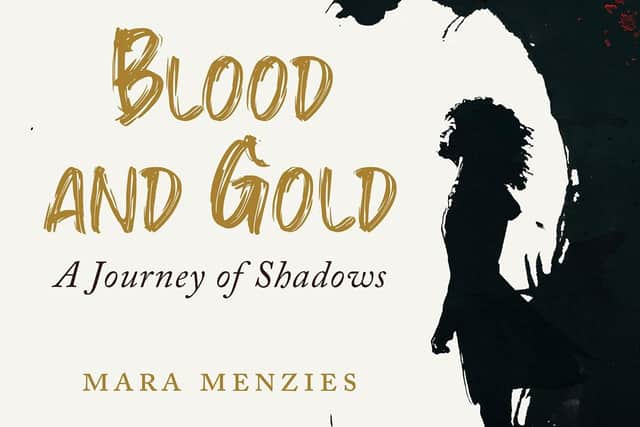

“There were the ogres who lived in the well and snakes and lions who disguise themselves as beautiful men or women to trick the humans - so if you see somebody incredibly beautiful take care.”
At what age did Menzies stop believing in the stories of lion people?
“I don't know if I ever stopped!” she says and laughs. “I think as a storyteller when you're telling a story you have to tap into that childish part, where you think anything is possible.”
The bare facts of Menzies’ own story are powerful enough for a book in themselves, but she wanted to look at the bigger picture and called on her storytelling toolbox to help.
“The intention was to look at the legacy of colonialism and slavery,” she says. “So having these stories in a box, was about having this girl explore different aspects of herself, whether it's her own personal story, or the movement of people, and of course one of the last stories is inspired by the racist murder of Axmed Sheekh in the Grassmarket, so even if you are very comfortable and know where you come from and how you fit into the world, you actually have zero control over what everybody else thinks about that process. I felt that having lots of different stories made it complete.”
Using symbolism and myth, she creates a safe space to confront issues and uses storytelling as a means of mediation.
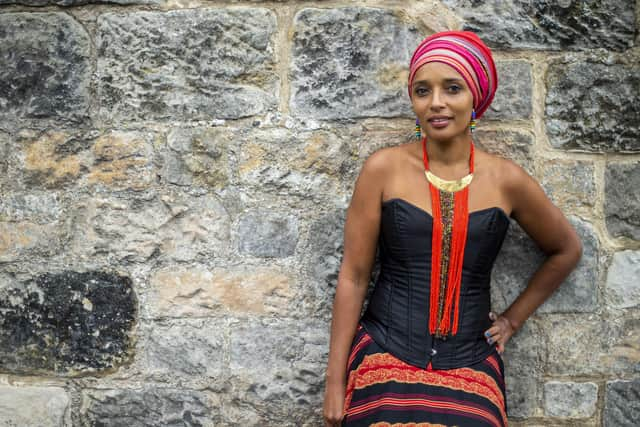

“There are a lot of things I wanted to explore; obviously the legacy of colonialism and slavery, and I feel that sometimes it's so based in fact - the injustice and cruelty and power and greed and all of these very, very negative things - that either we can become quite numb to them or there's a lot of finger pointing or barriers go up and people become very defensive so it's a very uncomfortable conversation to have.
“I felt by doing it through myth and legend it's an opportunity for people to be able to just take a step back and look at it through a very, very different lens. I grew up in a culture in a colonized country, and Kenya is still very colonized - the laws and systems and policies in place are still very much rooted in what the British government put in, which actually is not very advantageous to the indigenous population, even to this day.”
“Also with slavery and the movement and displacement of people from Africa to the Caribbean, to Britain with the whole Windrush generation, and every other way people moved, I wanted to look at identity and belonging. Everybody needs to identify with their roots, and for people who are taken by force it's impossible for them to ever find out where they come from. The legacy of this uprooting is you’re disenfranchised, where is your power, where is your base, where is home?”
For Menzies, the Black Lives Matter movement has raised concerns about how we handle the issue in Scotland, and face up to our past.
“I feel in Scotland we're quite good at not acknowledging our role in the slave trade and letting England take the blame for a lot of things where actually we were quite instrumental in everything that was happening there. So we also need to explore that unpleasant and dark part of our history if we're going to move forward in any sort of honest way.”
As Menzies sees it the kind of racism that resulted in the death of Axmed Sheekh in the Grassmarket has its origins in the dehumanization of black people to justify the transatlantic slave trade.
“Because as a good Christian country you couldn't have acted like that to another human being it was necessary to make people inhuman. The racism we see nowadays stems from that because in the media black people are often portrayed as inferior, violent, aggressive and intellectually inferior.”
She also points out that most Scottish school children would struggle to name a black African leader or achiever, who wasn’t Nelson Mandela.
“There are many people of African heritage who have invented things, who are high achieving in lots of different ways but we never ever, ever hear those stories. And actually that is a very simple way of challenging the notion of this is what black people and the continent of Africa has produced over time. Just change the narrative, and when it becomes normalized in that way it's just the reverse of the normalizing that they had to do during the slave trade.”
“I think the conversations that were happening through Lockdown with Black Lives Matter, some of them made me really uncomfortable because it felt that we were segregating ourselves from each other, and people were afraid to say what they actually felt and be victimised or trolled. We need to be a society where we can be free to say what we feel and if everybody disagrees with you that's actually OK. Either you learn something or people will be presented with another perspective and that's how we learn from each other.”
“We are challenging the narrative that we've been fed for such a long time that Empire is good and great and Britain is great because of what we did colonizing the world. We miss out all the terrible things that happened in order for Britain to become great, and I think now that we're starting to break it down it's important not to be filled with any sort of sense of shame about yourself or your history. It's not that you have to carry the burden of your ancestors - they did evil things but everybody in Scotland also benefits in many ways from the proceeds of slavery, so where does it all end. Humans are inherently flawed but it's appreciating how it happened and saying I'm in a position to maybe do things differently.”
Menzies is looking forward to continuing the discussion when she chairs an event at Wigtown Book Festival with Alex Renton, author of Blood Legacy, which looks at his family’s role in slavery as plantation owners.
“It’s where do we take it from here?” she says. “I love Scotland, I think Scotland it’s an amazing country and has the potential to be even more amazing and I like to think that in 50 years, 100 years, we're going to be in a much better place. Where do we want Scotland to be, how do we want our children to interact with each other?”
Menzies loved Scotland when she arrived as a teenager, her idealistic view mirrored in the book with references to Ulaya or The Land in The Sky, a place that isn’t always what it first appears.
“It was so exciting to come because you hear the stories of the UK and in all colonised countries there is the motherland and an expectation that things are going to be amazing and wonderful when you arrive.”
“I was being taken care of and for me it was really interesting and I enjoyed it. I wasn’t an adult arriving alone. So simple things like Cameron Toll shopping centre fascinated me because it was the first glass building I had ever seen. It’s not the bonniest, but where we lived you would never find a glass building, so to see a huge structure of glass… and then how everything was quite ordered, you know getting onto the bus at the front and leaving at the back instead of just running and jumping on... and parking meters. Everything was ordered, you’d go to school and clubs and classes, you didn't just kind of run out of the door and go, but I enjoyed it, because we had TV,” she laughs. “When you’re a kid and suddenly you’ve got technology, yes I enjoyed it.”
With many in Scotland unaware of their own folk tales and storytelling in Africa on the wane thanks to Western lifestyles at one end of the social spectrum and the need to hustle for a living at the other, Menzies has taken things full circle by opening a cultural centre in her grandmother’s village.
“It’s brilliant because people now have a platform to come along and perform and interact and storytelling can provide hope, or joy, or distraction from all the mess that's going on in life.”
As well as being a distraction, Menzies is an advocate of using storytelling as a tool to solve problems as much as to amuse, to change the perception that it's something old people do to entertain little children.
Prior to lockdown she was in Colombia working on storytelling for peacebuilding, with young people living with the legacy of war, and she has also worked with NGOs working to educate communities practising female genital mutilation. As well as further writing, possibly around the link between spirituality and mental health, she hopes to continue using storytelling in more diverse settings.
“It's using stories to kind of explore lots of different things and to challenge tradition or break negative behaviors. So on FGM we used stories as a way of getting the women to consider why it’s being practiced in their communities. Instead of a workshop where you hear the negative, damaging effects of FGM, you can tell a story that gets everyone laughing and acting out roles then have a discussion about traditions and how they affect women in that community. Who started the tradition and why? And when you start having those conversations you get somewhere and begin to question in a really safe space and the people from that community don't feel that you are an outsider coming in saying you can’t do this or that so put up barriers. So in places like that, you know, storytelling is hugely effective.”
“I like to think it helps us understand each other because it doesn't matter if you are a tiny child or old age pensioner or you're from here or there, whichever social background, we all understand injustice and oppression and the feeling of being dismissed as irrelevant. The things that hurt us and the things that give us joy tend to be similar. When you're using these things in stories, you know that they are going to hit home because ultimately we are all human. We want to be loved, we want to be appreciated. And I think that we want to feel that we are good people.”
https://www.youtube.com/watch?v=7Beg6C7N8Ls
Blood and Gold - A Journey of Shadows, Written by Mara Menzies / Illustrated by Eri Griffin, published 7 October by Birlinn Ltd, hardback £12.99
Mara Menzies will be appearing at the book launch at the National Library of Scotland on 14 October.
